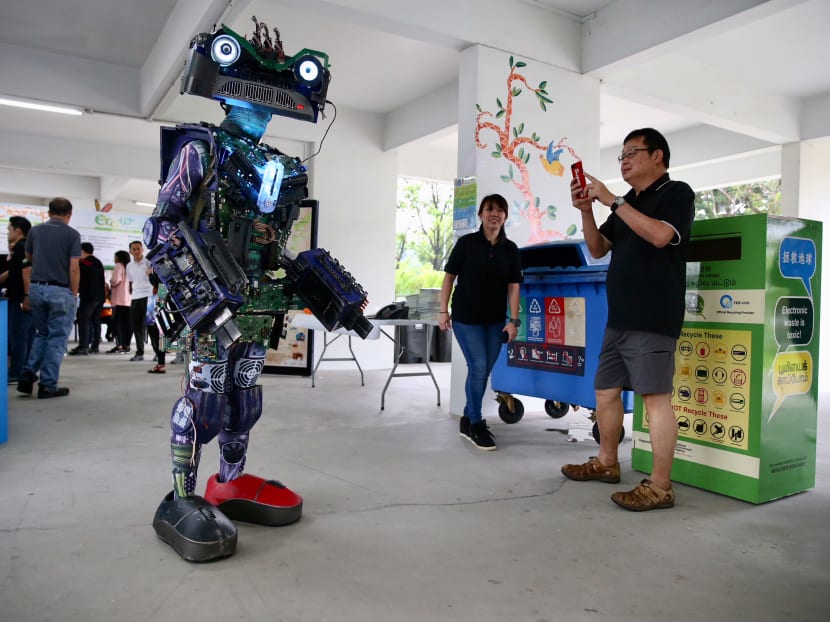Amid large amount of e-waste, recycling efforts start in South-west District
SINGAPORE — Those who do not know what to do with their old, unused gadgets such as laptops and desktop computers can now drop them off at electronic waste bins located in areas such as Bukit Batok and Alexandra where they will be recycled - and even get their data wiped off the devices for peace of mind.

E-Waste Monster seen during the Clean Up South West!, the district’s annual trash-for-groceries recycling drive, at Bukit Gombak Sunshine RC, on Sunday (Jan 14). Photo: Koh Mui Fong/TODAY
SINGAPORE — Those who do not know what to do with their old, unused gadgets such as laptops and desktop computers can now drop them off at electronic waste bins located in areas such as Bukit Batok and Alexandra where they will be recycled - and even get their data wiped off the devices for peace of mind.
The recycling points are part of a pilot project jointly organised by the South West Community Development Council (CDC), IT giant HP and National Environment Agency’s (NEA) South West Regional Office.
Launched on Sunday (Jan 14), the e-waste recycling points will be open till end of 2018, and the initiative targets to collect 10,000 desktop computers, laptops and monitors. This is equivalent to about 50,000 kg of e-waste.
Mayor of South West CDC Low Yen Ling, who officiated the launch, said: “We are seeing more e-waste with the growth of electronic devices. If not disposed properly, electronic items can pollute our environment and harm our health.”
According to NEA’s statistics, Singaporeans discard as much as 60 million kg of e-waste every year.
“To enable and encourage the recycling of e-waste, we are working with HP so that residents can bring in bigger electronic items like fridges and televisions...laptops and monitors,” added Ms Low.
But data that is still present in devices might be a point of concern for those considering whether to drop off their gadgets.
HP Incorporated Managing Director Lionel Chng stressed that all data will be thoroughly destroyed before the gadgets are recycled.
“We find that it is very important especially for PCs, the first thing is to properly data sanitise it, remove all personal data that is inside, then we can begin the process of refurnishing it or recycling it,” he said, adding that residents can erase their data the usual way first.
Those interviewed by TODAY said they would consider using the e-waste recycling points instead of throwing their old gadgets away.
Operations manager Kenny Lim said his family regularly recycles clothes, paper and plastic, But going forward, they also plan to recycle their laptops, batteries and even mobile phones.
“I think it is most important that it must be safe for the environment,” said the 59 year old.
“I’m also concerned that I can’t fully erase my personal data in my laptop, but since HP has said that it will wipe the data, it should be ok now.”
Housewife Ms Fiza Abdjalil, 34, added: “I didn’t know about recycling e-waste, but now that I know, I can recycle them instead of throwing them away.”
Beside the South West CDC’s initiative, there are at least eight other e-waste recycling projects taking place. These include Panasonic’s Heartland E-Waste Recycling Programme, and Singtel x SingPost E-Waste Recycling Programme.






